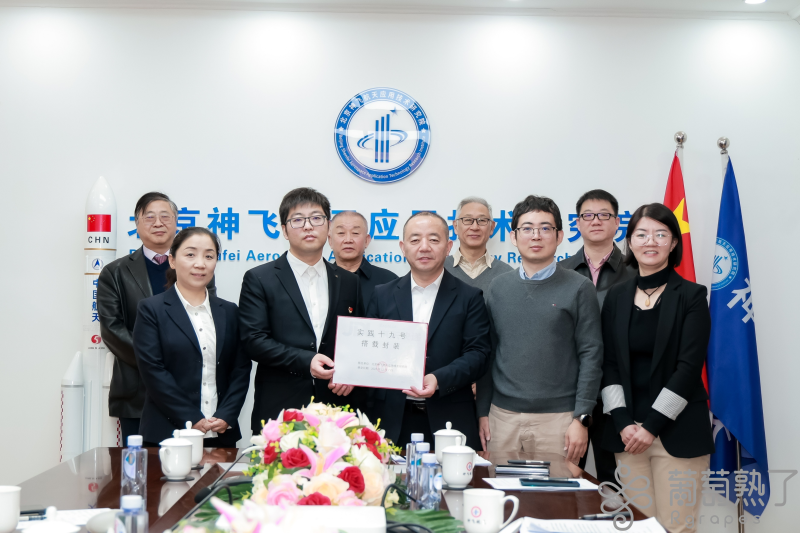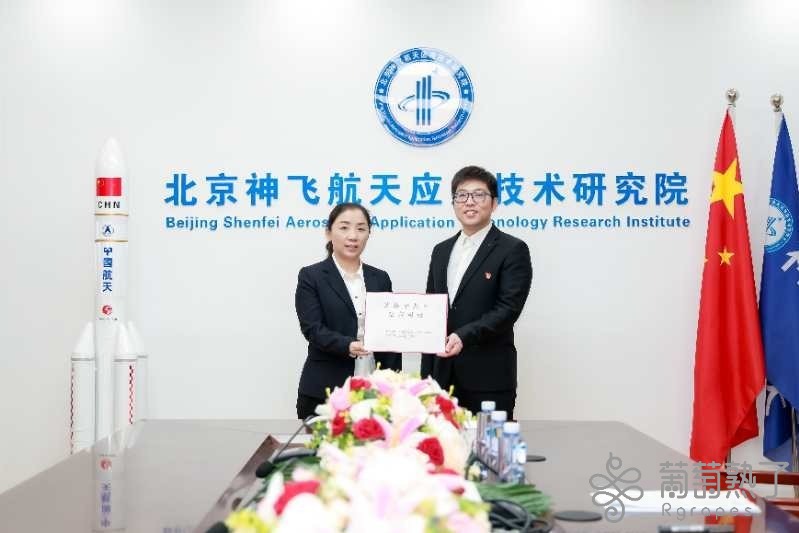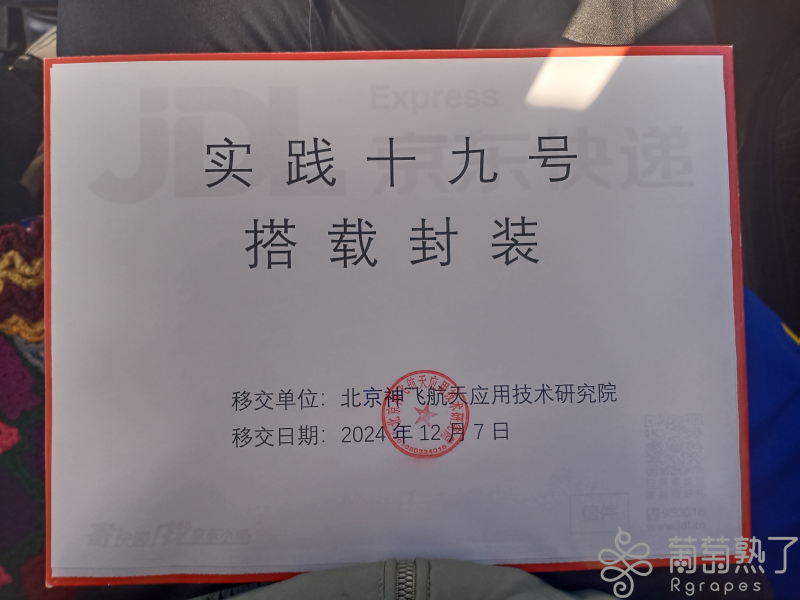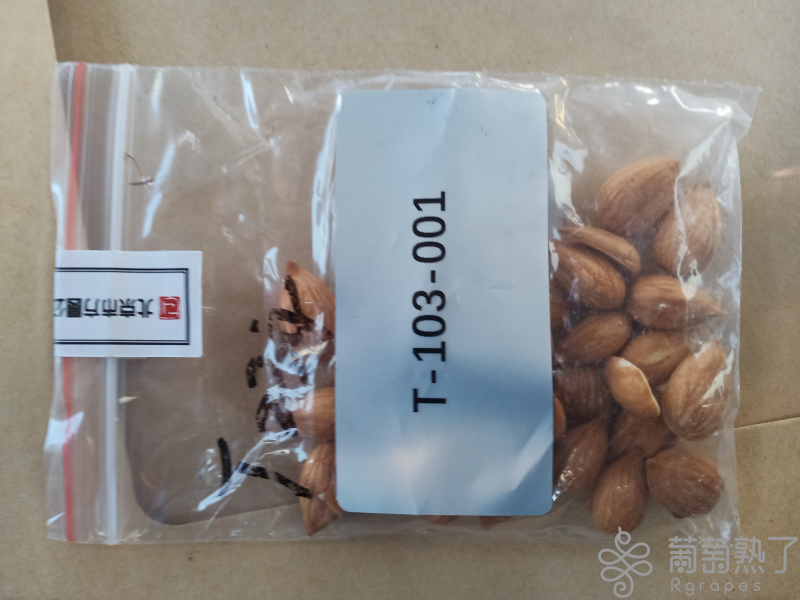On December 7, 2024, at the payloads handover ceremony held by the Beijing Shenfei Aerospace Application Technology Research Institute following the return of the satellite, Shijian-19, apricot seeds from Turpan City, northwest China’s Xinjiang Uygur Autonomous Region, were among the payloads that successfully completed their space breeding journey.

Photo shows the payloads handover ceremony held by the Beijing Shenfei Aerospace Application Technology Research Institute for the transfer of apricot seeds that have undergone space breeding. (Photo provided by Turpan Municipal Grape Industry Development Promotion Center)
It is understood that Shijian-19, China's first reusable and returnable technical test satellite, was launched on September 27, 2024 and successfully recovered on October 11, fully leveraging the advantages of the new generation of recoverable space test platforms, which include a short breeding cycle and high carrying efficiency. The carrying of apricot seeds in this mission aims to induce new varieties through the special environment of space, further improving the quality and yield of Turpan’s apricots, and promoting the development of the characteristic fruit industry in Turpan City.

Photo shows representatives attending the payloads handover ceremony held by the Beijing Shenfei Aerospace Application Technology Research Institute for the transfer of apricot seeds that have undergone space breeding. (Photo provided by Turpan Municipal Grape Industry Development Promotion Center)
However, space breeding is not an overnight success. Due to the non-directional nature of space breeding, not all seeds undergo desirable mutations. Therefore, after being exposed to the special conditions of space such as cosmic radiation, microgravity, and high vacuum, these seeds still require multiple generations of selection and cultivation to ultimately lead to new varieties with stable characteristics.

Photo shows the packaged apricot seeds at the payloads handover ceremony held by the Beijing Shenfei Aerospace Application Technology Research Institute. (Photo provided by Turpan Municipal Grape Industry Development Promotion Center)
Since 2022, the Turpan Municipal Grape Industry Development Promotion Center has collaborated with Beijing Forestry University and other institutions to send seeds into space for breeding. In 2023, the Xinyu grape seeds of Turpan were carried into space aboard the Shenzhou-16 manned spaceship. This year, with the support of Beijing Forestry University, Qinghai University, and the Xinjiang Academy of Agricultural Sciences, the center's selected white apricot seeds have become the "lucky ones," securing a "ticket" to board the Shijian-19 satellite for a journey into space.

Photo shows the packaged apricot seeds at the payloads handover ceremony held by the Beijing Shenfei Aerospace Application Technology Research Institute. (Photo provided by Turpan Grape Industry Development Promotion Center)
"We have selected Turpan's white apricot seeds for space breeding experiments, hoping that through this space mutagenesis, we can screen for germplasm resources with excellent traits to cultivate new strains and varieties with stable genetics and high quality, thereby extending the shelf life of white apricots," said professor Yang Qing from the School of Forestry at Beijing Forestry University. The quality of white apricots is excellent, but they have thin skin and are juicy, making them unsuitable for transportation. Through space breeding, it is hoped that germplasm resources with good taste, high sugar content, sufficient moisture, thicker cell walls, and a longer shelf life can be selected to improve the variety of white apricots, reduce transportation costs, and enhance the competitiveness of agricultural products.

Photo shows white apricot seeds delivered at the payloads handover ceremony held by the Beijing Shenfei Aerospace Application Technology Research Institute. (Photo provided by Turpan Municipal Grape Industry Development Promotion Center)
The apricot industry is one of the characteristic industries of Turpan. In recent years, Turpan City has fully leveraged the brand effect, promoting the deep integration of agriculture, culture, and tourism through events, such as the apricot blossom season and the apricot picking season, enhancing the visibility and brand influence of the apricot industry. This year, the city's apricot cultivation area reached 85,000 mu (about 5,666.67 hectares), with a total output of 622,400 tons. The main varieties include more than 10 types. During the 2024 Turpan Apricot Blossom Festival, the city received a cumulative total of 1.8192 million domestic tourists, a year-on-year increase of 15.11 percent; and achieved a tourism revenue of 790 million yuan (about 109 million U.S. dollars), a year-on-year increase of 43.08 percent.
(The Media Convergence Center of Turpan City, Reporter: Jiapar, Correspondent: Wu Yunlong)









